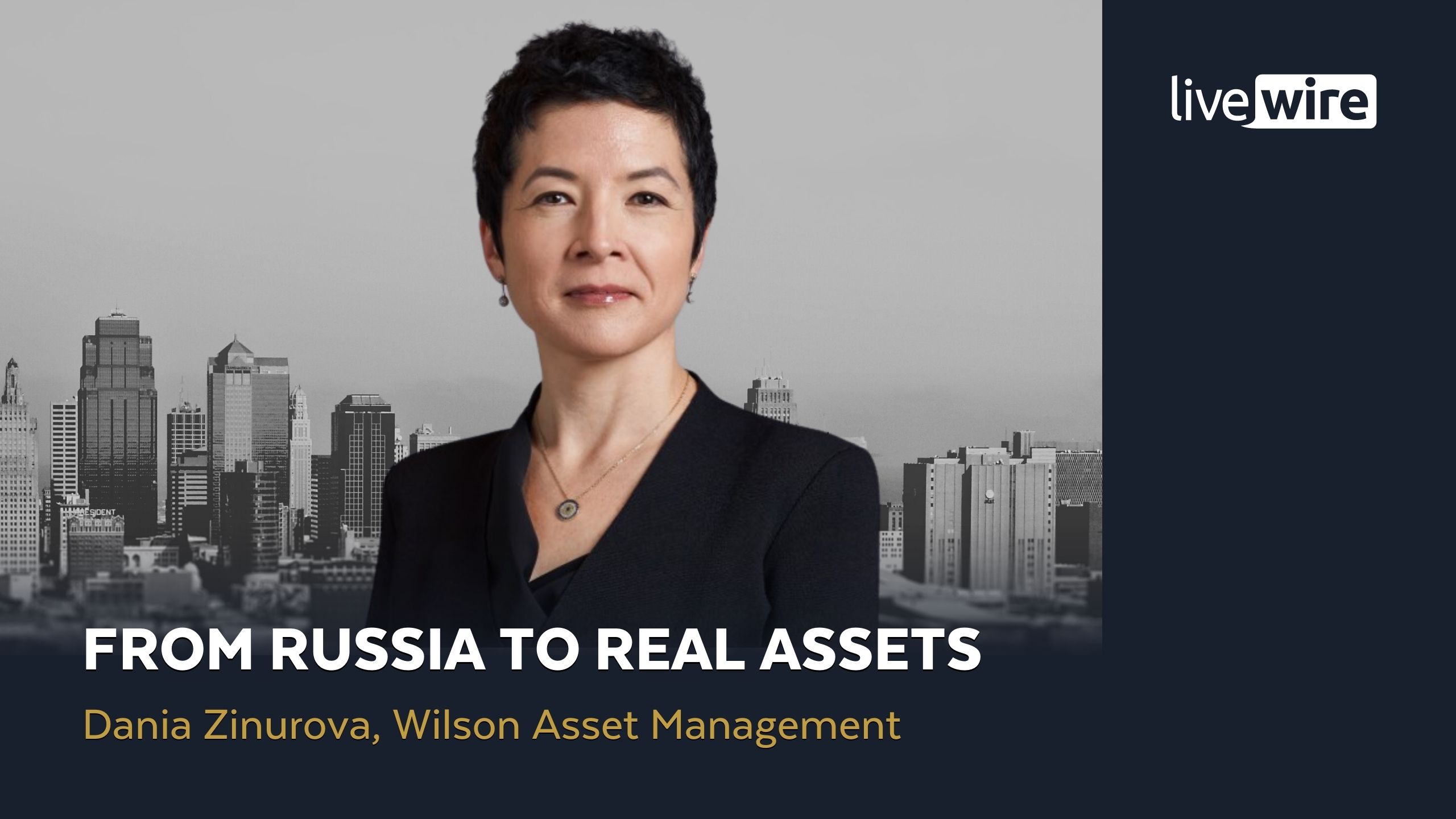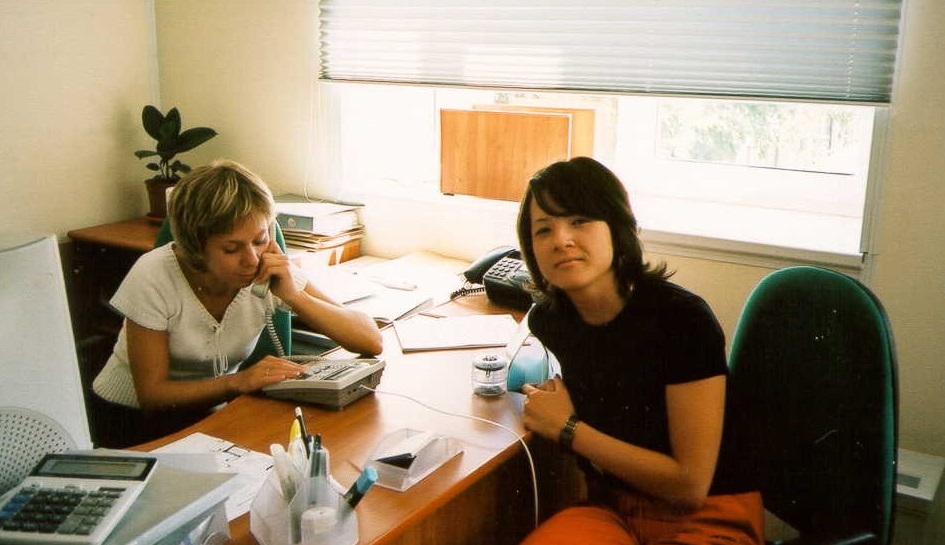From Russia to real assets: How this portfolio manager is democratising alternatives
Russian-born Dania Zinurova has come full circle. Having started her career in finance as the local industry shifted away from central, government-controlled banking, to a more democratic, commercial model, now, she is once again bringing a complex financial solution to the people.
It's been a year since Zinurova was tasked with leading the then recently acquired WAM Alternative Assets (ASX: WMA) portfolio (previously the Blue Sky Alternatives Access Fund), which became the seventh listed investment company (LIC) to enter prominent investor Geoff Wilson AO's stable.
For Zinurova, who previously worked as the Australian director of manager research and head of real assets for Willis Towers Watson, this asset class provides much-needed diversification to investors' portfolios, as well as stable yields and downside protection in equity market drawdowns. As an added bonus, alternative assets serve as an inflation hedge, an important consideration in the current market environment, she adds.
While institutional investors (the likes of our superannuation funds, for example) have long invested in alternatives (in fact, Zinurova notes Australia is leagues ahead of our global peers in this regard), it has been notoriously difficult for wholesale and retail investors to access the asset class.
"To be very blunt, the unfair treatment of wholesale and retail investors really shocked me, in particular, when it came to fee structures in alternatives - it was extremely expensive," Zinurova says.
In fact, investors were expected to cough up a minimum investment of around $10 million to invest in the asset class, she says. Certainly not chump change, or even close to the standard set by equity or fixed income managers.
It's this dilemma that led Zinurova to ponder how the industry could create an alternative investment offering that was easily accessible (and affordable) for Australia's wholesale and retail investor market. She says she had already been deliberating this idea for three years before Wilson Asset Management secured the management rights for the Alternatives Access Fund of the now-defunct and still controversial Blue Sky Alternatives Investments.
For background, at its height, Brisbane-based fund manager Blue Sky had a valuation of $1.2 billion and managed more than $4 billion for its investors. Its 80 funds were invested in private asset classes like venture capital, real assets and private equity. Blue Sky became widely popular with retail investors before an activist short-seller report kickstarted its downward spiral.
Now, a year after Wilson Asset Management took over the LIC, it has $229.4 million in AUM and is trading at a 12.7% discount to pre-tax NTA (as of October 31st, figures from Wilson Asset Management). Prior to the Wilson Asset Management deal, and under Blue Sky's management, the fund traded at a 33.7% discount to pre-tax NTA (source Blue Sky/Wilson Asset Management). The portfolio's gross total return was 17.3% over the 12 months to the end of October. Its share price has returned around 13.4% over the same time period (inclusive of dividends).
After a year of managing the WMA portfolio, I spoke to Zinurova for insight into the challenges of managing illiquid assets via a liquid investment structure, as well as how she has transformed the portfolio over the past 12 months and where she is seeing opportunities in alternatives over the decade to come.
Note: This interview took place on Wednesday 10th November 2021.
.jpg)
Investing in an illiquid asset class via a liquid structure
The WMA portfolio invests in illiquid alternative assets, the likes of real assets, private equity, real estate, private debt and infrastructure. It can sometimes take 12 to 24 months for capital to be deployed into a new strategy, or for the LIC to exit an investment. Considering this lack of liquidity, a LIC structure - meaning the portfolio's pool of capital is closed - has its advantages.
"You're not dealing with constant inflows or outflows like in the case of any unlisted open-ended real asset fund," Zinurova explains.
"They need to manage this very carefully because they usually have redemption windows and capital raising windows. So there is this constant, 'If we have redemption requests of up to 20% of the fund, how will we meet those redemptions?'."
As a LIC, it takes very careful cash flow forecasting in terms of the timing of exits of mature investments in the portfolio, Zinurova says, as well as managing the timing of new commitments.
"I want to be in a position when those opportunities come, rather than me sitting and waiting for the next exit within the portfolio, to commit capital to this new investment opportunity," she says.
"But it's a live process, it's a live portfolio that's constantly changing. Again, it would be very different if you looked at an unlisted closed-ended structure."
In comparison, in a closed-ended structure, an investor would have to commit to eight to 10 years of illiquidity, which would mean the portfolio manager can deploy this capital over the time period, and then exit to pay out redemptions to its investors.
With the LIC structure, investors can benefit from not only the portfolio's returns but also the share price performance of the investment company, Zinurova says.
"The total shareholder return was over 40% for the financial year, and that's because, yes, WMA did trade at a deep discount at a point, and there was a lot of work done towards eliminating this discount, and we are now in a very good position," she says.
Major changes since the portfolio joined Wilson Asset Management's stable
At the core of the WMA portfolio is the concept of "democratising alternative asset classes and bringing these high-quality strategies to the broader market," Zinurova says.
"I need to think, does this portfolio provide diversification benefits? What's the correlation between the asset classes within the portfolio to other more traditional asset classes? What's the volatility of WMA versus broader equity markets? What's the potential for inflation hedge within this portfolio," she says.
Zinurova notes that when Wilson Asset Management took over the management of the LIC, most of its investments were already close to their maturity and were ready to soon be exited.
"You can imagine the level of due diligence I did before I took this role, and I knew quite a material part of the portfolio fairly well because I worked with some of the teams within Blue Sky in the past when I was at Willis Towers Watson," she says.
"Most of the illiquid, inherited investments, they were already close to their maturity."
For example, Better Medical was one of the portfolio's inherited investments, made by Blue Sky's private equity team back in 2017. At this time, the business had six clinics in one state. By the time Wilson Asset Management took over management of the portfolio, the business had expanded to over 30 different clinics across Australia.
"So basically, this is the time when you realise capital gains for your investors. And so earlier this year, this investment was exited, which was perfect timing, because these types of investments in private equity are in high demand," Zinurova says.
For Zinurova, the LIC's portfolio of alternative investments needs to have a solid core of income-producing strategies - which could be infrastructure, real estate, private debt and real asset opportunities.
"This provides a more reliable and more sustainable income stream within the WMA portfolio and allows us to gradually grow our profit reserve in a very sustainable manner," Zinurova says.
On top of that, the portfolio also needs to be exposed to growth assets - like private equity, venture capital and higher-risk strategies within real estate and infrastructure.
With this in mind, Zinurova outlines two of the WMA portfolio's new investments for this year.
"One was an investment in the Palisade Diversified Infrastructure Fund. It's a well-established infrastructure fund manager with a track record of nearly a decade, with a mature portfolio of about 22 assets within the portfolio, and minimum exposure to greenfield risk," she says.
This Fund's assets all produce sustainable yields and are diversified across various infrastructure sectors, she adds.
"From the income return perspective, it's a very good strategy to have within the portfolio. And on top of that, it can often be seen as an inflation hedge," Zinurova says.
Another investment was in the Barwon Institutional Healthcare Property Fund, she adds, which plays to the megatrend of a growing ageing population.
"It's actually quite incredible to see the demand for healthcare services, it definitely outpaces supply," Zinurova says.
"I found this Fund really interesting because it's one of the few sectors within real estate where you still observe long weighted average lease expiring profiles. So in the case of Barwon, it would be over 10 years, while if you look at the sectors like retail offers, it's probably around five to seven years now, if not lower.
"In addition, within the healthcare real estate sector, leases are structured as triple-net leases most of the time. And they would have annual fixed increases, or sometimes CPI-linked increases."
In case you don't know - a triple net lease is an agreement on a property whereby the tenant pays all the expenses of the property (real estate taxes, building insurance and maintenance) in addition to rent and utilities. In comparison, landlords are typically responsible for these payments in standard commercial lease agreements.
The quality of tenants in this Fund is also "outstanding", Zinurova says, and is also well-diversified across 17 assets with "further growth" ahead of it.
"They have the opportunity to tap into this growing demand and acquire more assets," she says.
WMA is also poised to exit two redeveloped office assets in Manhattan over the coming months, as well as nine or 10 other exits which Zinurova believes will deliver "strong results" for investors.
There's a strong motivation for this portfolio of alternatives to succeed. WMA needs to trade at a premium to NTA at least three times over the five years since it changed hands, or it, like the company of which it originated, could be wound down.
"If that doesn't happen, shareholders can vote and basically dissolve the company. And this does give us very strong motivation to work on eliminating this discount," Zinurova says.
The best alternatives of 2021 and new areas of opportunity
While private equity was the top performer in the WMA portfolio (and also within alternative assets in the Australian market), Zinurova notes that investors shouldn't take a broad-brush approach when investing in the asset class.
"It can come down to the type of underlying strategies, to the vintage year, to the fact whether it's growth, venture or buyout, etc," she says.
"Having said that, it's definitely an asset class within alternatives where investors can expect quite a significant upside. If it's managed appropriately, and if it's done in the right way, private equity and venture capital were the investments where I saw solid valuation uplifts."
Real assets were also a top-performing asset class over the past year, both in the portfolio and the broader market, she says.
"We definitely saw some interesting deals happening in the agriculture sector, recently there were a few citrus orchard deals that were highly bid for," Zinurova says.
"These are all signals that the agriculture sector is on a very positive trend in terms of expanding arable land, growing the volume of the produce, and Australia is also definitely stepping up as an exporter on the global stage."
Meantime, real estate was an "interesting" sector for perhaps the wrong reasons.
"When we talk about more traditional real estate equity strategies, that was probably a bit more muted," Zinurova says.
"That was driven by the fact that there was lots of uncertainty with regard to fundamentals in the market - What will happen to the office? Will people go back to the office full time? Or does it mean a completely new model of how we're going to work in the future? What will happen with the retail sector? Do people continue shopping in the actual shopping centres, or is everyone moving online now?"
All these questions made investors more nervous. However, there were good results and inflows into real estate debt strategies.
"That's probably getting to the point of saturation, where we saw too much capital flow into these strategies, and that definitely impacts the returns, making them more compressed," Zinurova says.
Banking on the megatrend of digitalisation and technological evolution, infrastructure also looks to be an area of opportunity going forward.
"There are a few Australian-based infrastructure fund managers that launched strategies, looking at both the Australian market and also global. And most of them are now including digital infrastructure into their portfolios," Zinurova says.
"That would be asset classes like private equity, both mid-market buyout and private equity growth. And I'd expect to see more new names coming to the market in Australia, with more partners going on their own and setting up new private equity firms."
From Russia with Love
As a final note, and having worked in the industry for more than 20 years, Zinurova says the best lesson she can share with others in the industry is to be kind to those around you - your peers, your colleagues, and your investors.
It's an ethos she has likely taken from working across a handful of different markets during her time, having started off her career working as a currency trader in Russia, and later an investment analyst at Russell Investments and 3H Partners in London. She joined Willis Towers Watson in 2012, moving her life to New York, before jetting back to London with the asset consultant and finally putting down roots in Sydney, where she has lived since 2013.

"Even though I have worked in different markets, this industry is so small. You come across the same people throughout your career, be it in the US, in Australia, in Europe or anywhere else in the world," she says.
"Because it's a small industry, it's important to have strong professional ethics and integrity when you work with others. Well, not only in our industry, in any."
For investors, she recommends they remain patient.
"Never rush with investment due diligence, do it properly. And I'm saying this predominantly being very biased towards alternatives - patience needs to be exercised," Zinurova says.
"And think outside the box. Do follow new trends, do see new opportunities, do think differently from the crowd."
Never miss an update
Enjoy this wire? Hit the 'like' button to let us know. Stay up to date with my content by hitting the 'follow' button below and you'll be notified every time I post a wire.
Not already a Livewire member? Sign up today to get free access to investment ideas and strategies from Australia’s leading investors.
4 topics
1 stock mentioned
2 contributors mentioned


.jpg)
